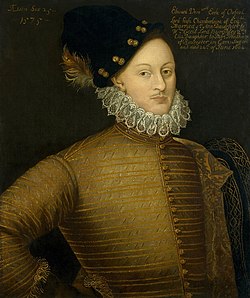Edward de Vere, 17th Earl of Oxford
| The Earl of Oxford | |
|---|---|

Edward de Vere, 17th Earl of Oxford, unknown artist after lost original, 1575, National Portrait Gallery, London
|
|
| Born | 12 April 1550 Hedingham Castle, Essex, England |
| Died | 24 June 1604 (aged 54) Kings Place, Hackney |
| Title | Earl of Oxford |
| Tenure | 1562–1604 |
| Other titles | Viscount Bulbeck |
| Nationality | English |
| Locality | Essex |
| Offices | Lord Great Chamberlain |
| Spouse(s) |
Anne Cecil Elizabeth Trentham |
| Issue |
Elizabeth Stanley, Countess of Derby Bridget Norris, Countess of Berkshire Frances (died before age 3) Susan Herbert, Countess of Montgomery Henry de Vere, 18th Earl of Oxford Sir Edward Vere (illegitimate) |
| Parents |
John de Vere, 16th Earl of Oxford Margery Golding |
| Signature | |
Edward de Vere, 17th Earl of Oxford (/də ˈvɪər/; 12 April 1550 – 24 June 1604) was an English peer and courtier of the Elizabethan era. Oxford was heir to the second oldest earldom in the kingdom, a court favourite for a time, a sought-after patron of the arts, and noted by his contemporaries as a lyric poet and court playwright, but his reckless and volatile temperament precluded him from attaining any courtly or governmental responsibility and contributed to the dissipation of his estate. Since the 1920s he has been among the most popular alternative candidates proposed for the authorship of Shakespeare's works.
De Vere was the only son of John de Vere, 16th Earl of Oxford, and Margery Golding. After the death of his father in 1562, he became a ward of Queen Elizabeth and was sent to live in the household of her principal advisor, Sir William Cecil. He married Cecil's daughter, Anne, with whom he had five children. De Vere was estranged from her for five years after he refused to acknowledge her first child as his.
De Vere was a champion jouster and travelled widely throughout Italy and France. He was among the first to compose love poetry at the Elizabethan court, and he was praised as a playwright, though none of his plays survive. A stream of dedications praised De Vere for his generous patronage of literary, religious, musical, and medical works, and he patronised both adult and boy acting companies, as well as musicians, tumblers, acrobats and performing animals.
...
Wikipedia
